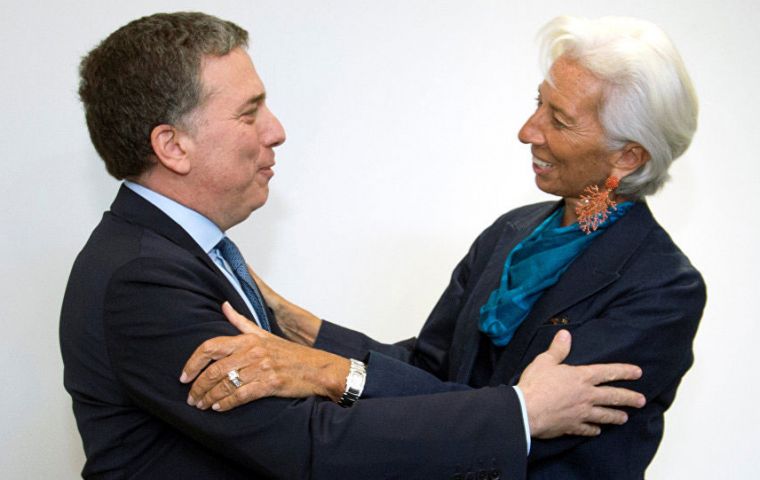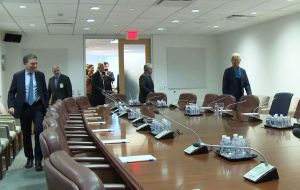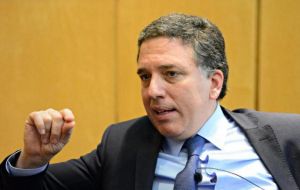MercoPress. South Atlantic News Agency
Argentina/IMF discussions continue this Wednesday; strong support from Trump
 The photo all Argentina was expecting: IMF Managing director Christine Lagarde greets Argentina's Finance minister Nicolas Duvjovne before talks started
The photo all Argentina was expecting: IMF Managing director Christine Lagarde greets Argentina's Finance minister Nicolas Duvjovne before talks started  “Discussions were held about how IMF can best support Argentina in the face of renewed financial volatility and a challenging economic environment” Lagarde said
“Discussions were held about how IMF can best support Argentina in the face of renewed financial volatility and a challenging economic environment” Lagarde said  Talks would continue on Wednesday, aiming to reach “a rapid conclusion to present a proposal to the IMF Executive Board”
Talks would continue on Wednesday, aiming to reach “a rapid conclusion to present a proposal to the IMF Executive Board”  Dujovne told the Argentine media in an improvised conference that it was too early to “give figures when we're in the middle of discussions with authorities.”
Dujovne told the Argentine media in an improvised conference that it was too early to “give figures when we're in the middle of discussions with authorities.” Argentina “made progress” on Tuesday in talks with the International Monetary Fund aimed at securing an accelerated disbursement of a US$50 billion loan it hopes will calm its debilitating economic crisis.
IMF Managing Director Christine Lagarde said she and Argentina's Finance Minister Nicolas Dujovne held “discussions about how the Fund can best support Argentina in the face of renewed financial volatility and a challenging economic environment.”
Lagarde said talks would continue on Wednesday, aiming to reach “a rapid conclusion to present a proposal to the IMF Executive Board,” during the second half of the month.
Dujovne said it was too early to “give figures when we're in the middle of discussions with authorities.”
Earlier, US President Donald Trump expressed “strong support” for Argentina, whose President Mauricio Macri has announced plans to slash the country's bureaucracy and raise taxes on exports to calm battered financial and currency markets and get the economy back on an even keel.
“I have confidence in President Macri's leadership, and I strongly encourage and support his engagement with the International Monetary Fund to strengthen Argentina's monetary and fiscal policies to tackle the country's current economic challenges,” Trump said in a statement after speaking with Macri for fifteen minutes.
Trump’s backing for Macri is important because the United States is the largest member on the IMF’s 24-member executive board, which would need to approve any new agreement with Argentina.
Previous to the IMF talks, Dujovne met with US Deputy Treasury Secretary for International Affairs, David Malpass, who also expressed support of president Macri's efforts and reforms.
The peso has lost half its value against the dollar this year, hampering government efforts to get inflation under control. Argentina has already used a first US$ 15 billion tranche of the three-year line of credit agreed in June, mainly to prop up its currency.
“Failure to secure further IMF funding or fiscal slippage before large debt repayments due in November would make default a very real possibility,” said Capital Economics in a note.
Andres Abadia of Buenos Aires consultancy Pantheon said Argentina's austerity measures “should be seen as a positive, but market confidence in Argentina remains fragile.”
The Washington talks come a day after Macri announced he is slashing the number of government ministries by half and restoring a tax on booming grain exports to bring deficits under control.
The move signaled the abandonment of a gradualist approach to reducing inflation by the market-friendly president, who was elected in 2015. “We must move a lot faster,” Marci said in a televised address.
Macri, a center-right politician elected on a commitment to economic reform, appealed to rich exporters to do their bit. “We know that this is a bad tax, but I have to ask them to understand that it is an emergency and we need their contribution”.
At the current exchange rate, the move would put an extra US$ 7.1 billion in state coffers.
Argentina has already pledged to cut its budget deficit to 1.3% of GDP in 2019, but at a press conference prior to leaving for Washington on Monday, Dujovne said it would go further next year and eliminate its primary deficit -- its borrowing needs before debt servicing.




Top Comments
Disclaimer & comment rules-

-

-

Read all commentsThis will end in tears. FMI will pony up the money which will subsequently disappear in the black hole known as the Argentine bureaucracy and Argentina will be 50 bn$ further into a fiscal hole they can't escape.
Sep 05th, 2018 - 08:33 am +2Unless Macri fires 100.000 public servants A MONTH and terminates pretty much every infrastructure project in progress, this simply can't end well. None of which he will do, btw.
Argentina will cook the books, blame everybody else and their grandmother and make biblical scenes but they will not, I repeat NOT, balance their books. They're Argentines, after all.
Enrique,
Sep 06th, 2018 - 04:04 pm +1It's not the Argentines, It's the Argentine politicians.
Jonaz said to fire 100000 public servants. I don't think he meant to fire teachers, nurses, doctors and firefighters. I think he meant the “ñoquis”.
That thought of his was totally sensible.
Oh, cry me politically correct a river.
Sep 06th, 2018 - 08:51 pm 0Argentina must fire 1.000.000 ñoquis to prevent a complete financial meltdown. Furthermore, public infrastructure programs such as Plan Belgrano must be put on hold until this situation has become better. The alternative is a 2001 catastrophe - but I guess someone would prefer such a scenario?
As a compromise, the ñoquis can stay at home with 50% pay. They do nothing of any value anyway, rather to the contrary, they perform anti-work.
And yes, there's something profoundly wrong with Argentine culture that generates these crises every 10-20 years. Just try to cross the street in Buenos Aires and you'll know what I'm talking about. Discipline = 0.
Commenting for this story is now closed.
If you have a Facebook account, become a fan and comment on our Facebook Page!